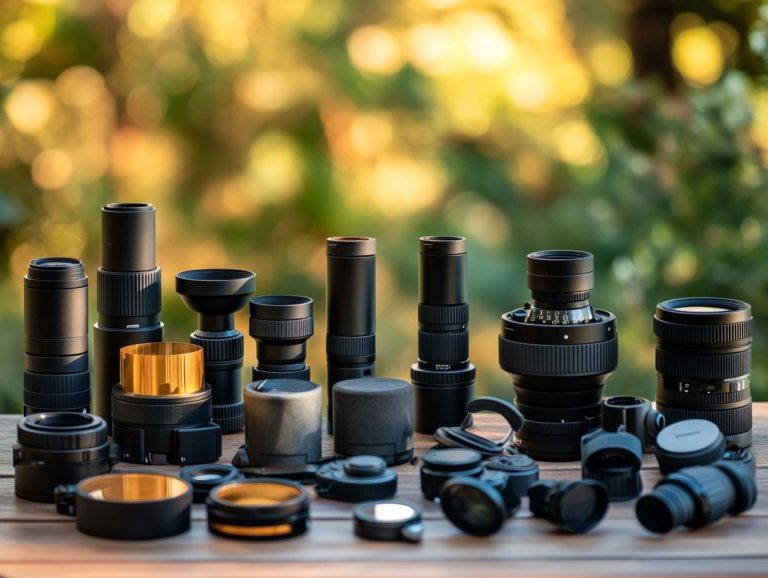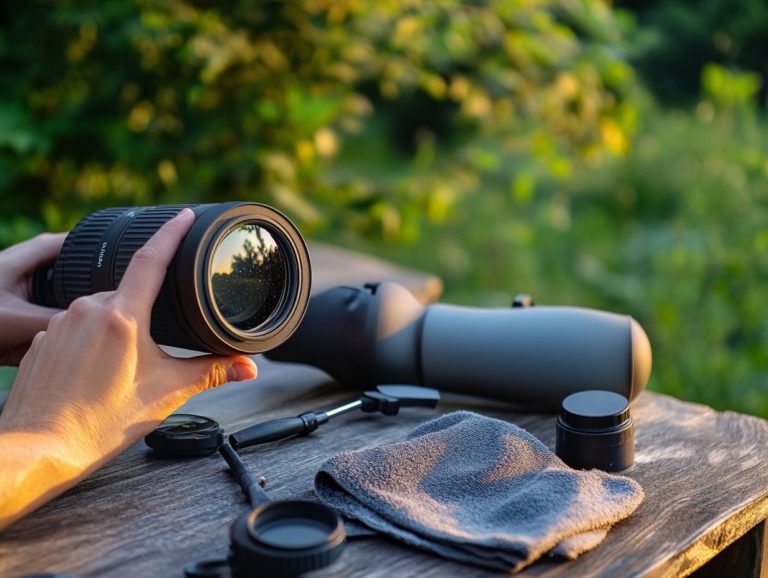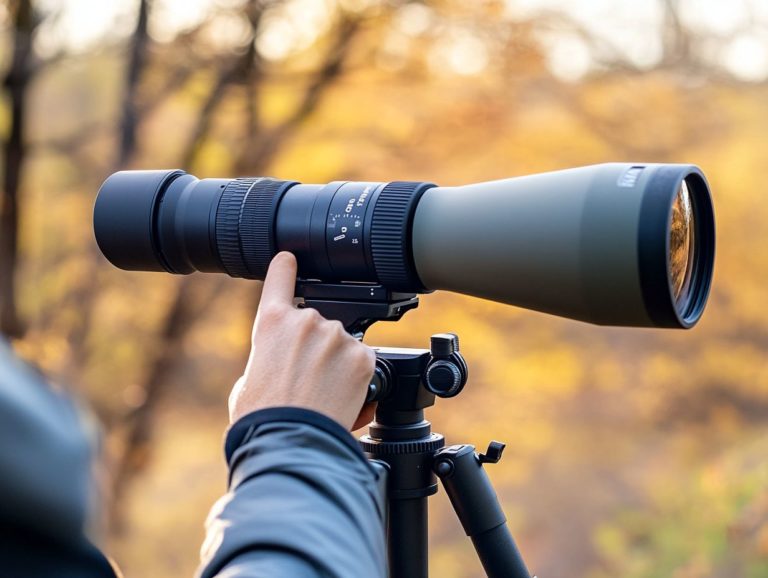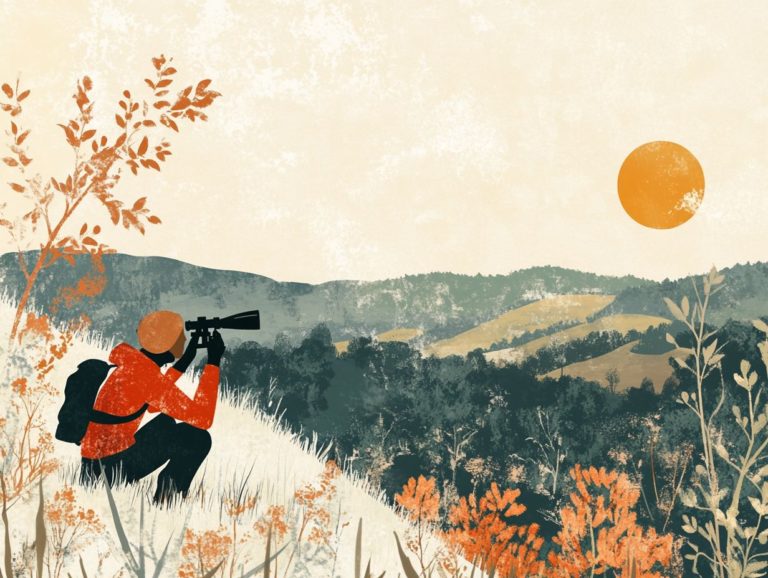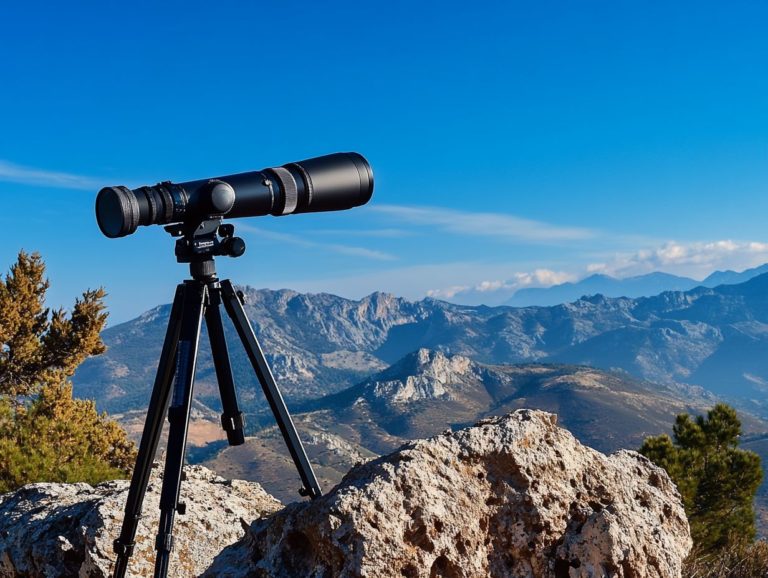Understanding the Importance of Focusing in Scopes
In today s fast-paced world, the struggle to maintain focus can feel overwhelming.
Mastering the art of focus is not just a skill; it can transform your concentration, efficiency, and overall decision-making prowess. Let s explore practical techniques that can sharpen your focus!
By grasping and applying these methods, you can unlock heightened productivity and a clearer mindset, setting the stage for both personal and professional success.
Contents
- Key Takeaways:
- Defining the Concept
- The Benefits of Focusing in Scopes
- How to Focus in Scopes
- Challenges and Solutions for Focusing in Scopes
- Incorporating Focusing Techniques into Daily Life
- Frequently Asked Questions
- What is the significance of focusing in scopes, and how does it affect performance?
- Can focusing be adjusted on all types of scopes?
- Why is it important to calibrate the focus on a scope?
- Does the distance of the target affect the focusing of a scope?
- What are the consequences of not properly focusing a scope?
Key Takeaways:

- Focusing in scopes involves directing your attention and energy towards a specific task or goal, leading to improved concentration and efficiency.
- By honing the skill of focusing, individuals can enhance their decision-making and problem-solving abilities, ultimately achieving greater success.
- Incorporating practical techniques can help individuals master focusing and integrate it into their daily lives.
Defining the Concept
In the realm of precision shooting and hunting, ‘variable power optics’ signifies a specialized type of scope aimed at elevating the accuracy and efficiency of long-range rifles.
These optics are essential for target shooting, giving you the power to focus clearly on your targets, no matter the distance. Brands like IOR Snipers Hide have earned acclaim for crafting high-quality scopes that cater to both amateur and professional marksmen.
By understanding how these optics work and knowing their essential components including the ocular (the part you look through) and lens (the glass that magnifies your view) you can make informed decisions that perfectly align with your specific needs.
The Benefits of Focusing in Scopes
Focusing on scopes offers you unparalleled advantages for achieving precision in target shooting and other shooting sports.
When you prioritize proper focusing, you gain a crystal-clear view of your target, which is essential for making accurate shots that can significantly elevate your performance across various shooting disciplines, including hunting.
Features like side focus let you make quick adjustments without losing sight of your target.
The fine and coarse adjustments enable you to fine-tune your aim with meticulous care. This is especially valuable when you’re working with high magnification scopes in challenging conditions, such as a sweltering 110-degree day in the city.
Improving Concentration and Efficiency
Improving your concentration and efficiency while using scopes can make a remarkable difference in your target shooting performance.
Concentration is essential when you aim for distant targets; distractions can turn into missed shots and lost opportunities. By mastering focus techniques, you can ensure that every shot from a distance is productive and effective.
Focusing on specific elements of the shooting process, like breathing techniques and mental visualization, can significantly enhance your ability to maintain clarity in high-pressure situations.
Simple exercises, such as practicing mindfulness or engaging in dry-fire drills, can sharpen your mental acuity and refine your physical mechanics.
Establishing a pre-shot routine allows you to center your thoughts and minimize external distractions, creating a mental environment that fosters optimal results.
By incorporating these techniques into your regular practice, you can elevate your performance and cultivate a greater sense of confidence and precision when using your scopes. Start applying these techniques today for a more productive tomorrow!
Enhancing Decision-Making and Problem-Solving

Enhancing your decision-making and problem-solving skills is crucial, especially in challenging shooting scenarios. Quick assessments of conditions like wind and distance lead to better outcomes in target shooting.
With a solid understanding of your environment, you can make informed choices about your equipment and techniques. This ultimately elevates your overall performance.
In competitive settings, where every millisecond can mean the difference between victory and defeat, honing these skills is vital for success. To boost your awareness of your surroundings, simulate various weather conditions during practice sessions to adapt your strategies on the fly.
Train under pressure to build the composure you need for quick decisions. This experience can be game-changing!
Seek feedback and mentorship from seasoned shooters. Their insights can greatly enhance your skills and guide you in grasping the nuances of optimal decision-making.
How to Focus in Scopes
Mastering the art of focusing in scopes is crucial for anyone truly dedicated to long-range target shooting or hunting. To achieve clarity on the target, grasp the mechanics of your scope, particularly the adjustments made via the rotating ring.
This adjustment process encompasses both fine and coarse tuning, optimizing your focus for different distances and conditions. By doing so, you ll ensure your shots are consistently precise and on target.
Practical Techniques and Strategies
When employing practical techniques and strategies for focusing in scopes, consider specific factors that influence your distance visibility. Use techniques like side focus to make quick adjustments while maintaining clarity at high magnification, essential in competitive target shooting or hunting scenarios.
Understanding how environmental variables, such as wind, lighting, and humidity, affect bullet trajectory can drastically enhance your performance. Assess your surroundings to compensate for wind drift, using flags or trees as visual cues.
By mastering your equipment’s limitations like recognizing parallax error (the shift in target position due to eye angle) or adjusting for reticle variations you empower yourself to optimize your setup across different environments.
Practicing at various distances allows you to develop an instinct for bullet drop and wind compensation. This enables you to engage targets with confidence, regardless of the situation.
These adaptable strategies hone your skills and cultivate a deeper appreciation for the art of shooting.
Challenges and Solutions for Focusing in Scopes
Focusing on scopes presents unique challenges, including common hurdles that many shooters encounter. Problems such as inadequate equipment like budget fixed Bushnells can seriously impact performance, making it tough to maintain a sharp focus on your targets.
You might wonder if investing in higher-quality scopes justifies the cost, especially when faced with these persistent challenges.
Common Obstacles and How to Overcome Them

Common obstacles to focusing can frustrate shooters and impact their ability to zero in on targets. These challenges often arise from environmental factors, equipment limitations, and mental distractions.
Outdoor shooters often deal with changing winds and fluctuating light conditions, which can distort perception and disrupt aim. Equipment issues, like subpar scopes and unreliable firearms, can complicate matters. Mental distractions, whether from stress or fatigue, cloud concentration and hinder performance.
To combat these challenges, consistent training is essential. Shooters might practice shooting without bullets, which is known as dry-fire practice, to refine their skills under less pressure. Employing visualization techniques can prepare the mind for distractions, boosting mental resilience.
Through dedicated practice and mental conditioning, shooters can build a foundation that enables sharper focus, leading to enhanced accuracy and consistency in their performance.
Incorporating Focusing Techniques into Daily Life
Integrating focusing techniques into your daily routine can significantly enhance your shooting practice, improving both your productivity and performance in target shooting.
By consistently honing your focus, you can foster a deeper connection with your experience scopes, translating into better accuracy during shooting sessions.
This seamless transition from practice to real-world application is crucial when facing challenging targets.
Tips for Maintaining Focus and Productivity
Maintaining focus and productivity in shooting requires intentional strategies that sharpen your ability to target clearly, especially during a distance look.
- Adopt specific practices like regular drills that emphasize focusing techniques.
- Incorporate mindful breathing exercises to enhance concentration.
- Use visualization techniques to picture successful target hits under various conditions.
- Establish a pre-shot routine to create a familiar rhythm that fosters calmness and clarity.
Physical preparation is equally essential. Engaging in strength and conditioning boosts endurance during long sessions and minimizes distractions from fatigue. By harmonizing mental and physical training, you will be better equipped to maintain concentration, especially in high-pressure competition situations.
Frequently Asked Questions
What is the significance of focusing in scopes, and how does it affect performance?

Focusing in scopes allows for a clearer and more accurate view of the target, resulting in improved accuracy and precision in shooting.
Can focusing be adjusted on all types of scopes?
Yes, most scopes come with adjustable focus settings to accommodate different shooting scenarios and personal preferences.
Why is it important to calibrate the focus on a scope?
Calibrating the focus ensures that the scope suits the user’s eyesight, providing a clear image without strain or discomfort.
Does the distance of the target affect the focusing of a scope?
Yes, the distance of the target can affect scope focus and may need adjustment for optimal viewing.
What are the consequences of not properly focusing a scope?
Failing to focus a scope can lead to blurry images, resulting in missed shots and decreased accuracy.
Start practicing these techniques today to elevate your shooting skills!

